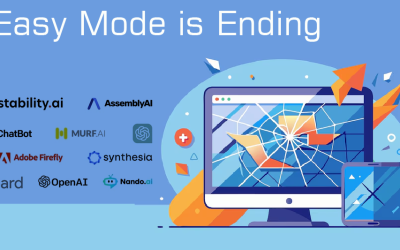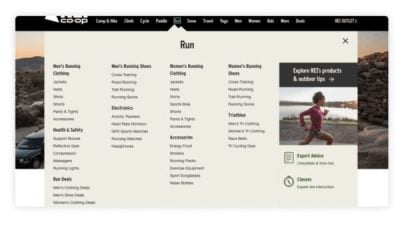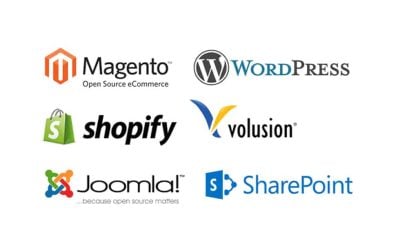Website builders vs. Web Designers | Website makers vs website developers
We live in an online world where having an awesome website has become an essential component of a successful business. A badly-designed website is likely to have people clicking the “x” in the top left of the screen before they’ve even glanced at what you’re selling, have high bounce rates and low conversion rates to say the least. But what’s the best way to get a website: website builder or web designer?
Let’s compare the best ways to get a website.
Should you use a DIY website builder or should you hire a web designer? There are pros and cons to both. Here, we explore the differences between the two so you can discover which one is best for you.
Before you start: determine your business needs.
Before you decide whether a website builder or web designer is right for you, you need to determine your business needs and get clear on what you’re expecting your website to do for you. Consider all the different pages and functionalities you might need.
Do you want customers to be able to purchase something? Then you’ll need a shop system integrated with a payment gateway or a rfq system for a client base that isn’t comfortable with online purchases. Do you want to create content on a regular basis? Then you’ll need blogging functionality. Do you want people to fill out a form or create a user profile? Or are they just visiting your website for information? What we call catalogue websites. Are people going to create accounts on your website, get referral bonuses? is your website going to have a custom shipping functionality based on weight on location? Ths list of what websites can do in almost endless.
Another important question to ask yourself is: are you okay with having a more generic looking website or do you want something more unique and custom-built?

Unique and custom branded website design
Depending on your functionality needs, you’ll be able to figure out how to get your website set up and who you need to work with. This will also have an impact on cost and how long it will take to create your website. Once you have a good idea of what you need and what you expect your website to do, you can consider your options for setting up your website.
Different ways to create a website
So, what ways are there to design a website?
- The template solution: use a DIY website builder
- The custom solution: hire a freelance web designer or web design agency
- The hybrid solution: hire a designer to customize a template
The most common ways are to either use a template-based website builder or to work with a web designer to create a custom website—either by hiring a freelance web designer or by working with a web design company or agency. The third option is to use a combination of website builder and web designer for a hybrid solution this is most often the most costly of all the solutions.
What is a website builder?
A website builder is a DIY tool that allows a user to construct a website using pre-made templates, without having to design it or write the code themselves. Website builders offer a variety of different design templates from which to choose from. Top builders feature quite a few options, so finding the one that suits your needs shouldn’t be difficult. From there you can add widgets and design elements to your site to customize the template.

Wix website builder template
There are a number of website builders out there and competition is fierce. A few of the most popular available today include:
- Squarespace
- Wix
- Weebly
- Jimdo
- Shopify
- Simvoly
These are just a few of many website builders out there at your disposal.
Website builders are available as online and offline platforms. The difference between the two is simple—an offline website builder is a program that allows you to build your website through a platform downloaded on your computer (vs doing everything through your browser or a local host environment). When you have constructed the design elements of your site, you’re able to upload files from your computer to a web host and publish the finished onto your hosting server.
Online website builders are platforms that operate online (Wix and Squarespace are the heavy hitters). Using these online platforms, you’re able to build your website completely online with nothing more than an internet connection and browser.
Some website builders also offer solutions for businesses that want to customize their website beyond what their templates permit. That’s what we’ll call a “hybrid solution”—more on this later.
The drawbacks of online website builders
Time-consuming
Especially if it’s your first time, even the pretty intuitive set-up of DIY web design sites still requires a learning curve. That’s fine if your time isn’t better spent making new contacts, building relationships, making sales calls or looking after existing customers. If the time you spend learning to use the website builder is actually costing you unseen money, it’s a false economy.
Restrictive designs
Free or cheap templates are great for hobbyists or simple sole trader operations. But as soon as you want more control over the design and layout of your site – sometimes even the colour palette – you’ll find them frustratingly limiting. All too often, you’re trying to shoehorn your brand into a fixed layout. Sometimes, you’ll spend hours working on a template only to find that your logo can’t change position or, worse yet, doesn’t fit properly within the space provided.
Minimal functionality
Website builders don’t tend to feature much additional functionality. After all, multiple, bespoke functions don’t really fit with the cheap-and-speedy selling point. For anything much more than a contact form, a standard photo gallery or a simple shopping cart system, you’ll need something more powerful and flexible.
Amateur image
Not always, we must stress, but in a lot of cases, the designs you’ll find on online website builders aren’t the most professional. We’ve actually seen some very good template designs, but often the fixed format simply means that thousands of websites end up looking either very much the same or looking worse once the business owner’s own images replace the stock images supplied with the site. The result is that it can look as though you’ve gone cheap and basic.
Poor SEO performance
SEO, or Search Engine Optimisation, is the expert practice of helping a website to appear high up in online search results for your business category. Online website builders have very limited SEO tools built in and only basic guides to teach you what you need to do. A professional web designer will usually understand every aspect of SEO, from clean code to correct image tagging, to make your website really easy to find.
Slower website speeds
Online website builders tend to use shared servers for hosting. This means less bandwidth and slower page load speeds, which is fine for small brochure sites with low traffic and minimal media, but not ideal for large visitor numbers, streaming or hosting videos.
Reduced security
Servers hosting hundreds or thousands of other websites require top-level security; hackers hacking one site may well find an ‘in’ to yours. It pays to be thorough with security.
No backup
Not every do-it-yourself web builder provides automatic backup services, which can be a problem if there’s a security breach or if you want to upgrade or move your site and its content elsewhere at a later date.
Nobody to correct your mistakes or guide you strategically
This is the biggie, really. With a cheap website, you aren’t going to get an outsider’s view of your business. Or any understanding of how users interact with a website and how to guide them to do what you want them to do. Or expert input into all the things you should consider before you start, like site structure, usability and future-proofing to prevent later expense.
Or an idea of how your website could develop over time. Or experience and insight to integrate your online and offline marketing. Or complete search engine optimisation that maximises your visibility with your target audience.
Or what website functionality could save you time and money or publicise your business better or serve customers more effectively. Or the ability to build future features into the initial build. Or guidance, planning and hands-on help with content – from the words that sell to shareable images and downloads.
Costs
Diy website builders are deceptively expensive, for the most part many widgets (code packets that will enable a functionality) will have to be purchased on a annual or monthly basis instead of a once off fee that design agencies usually offer. The other thing to consider is this. Because of the scaling limitations of website builders or the possible limitation of creativity and user experience you may n the future need to get a real web designer and or developer to facilitate your business growth. This will be costly as they will likely start from scratch and most website builders don’t offer you a way out with your website.
What is a web designer?
A web designer is a graphic designer who can design your website completely from scratch. With a website builder you have to work within the parameters of set templates that are offered, while a web designer will craft your website from a blank canvas.
You can either work directly with a freelance web designer, who creates your web design for you. Or you can hire a web design agency or company that has a whole team of web designers, developers and marketers who can take care of everything for you—from the concept stage to the finished website.
Web designer vs. web developer
Be sure not get web designers and web developers mixed up. A developer is in control of turning your web design into a functioning platform while a designer is all about aesthetics—what your site is going to look like. Web designers create the design for your website, which then needs to be built. That’s where web developers come in. They construct websites; they’re tech wizards who understand coding and can turn a web design into a real, working website. Agencies will have both of what we call a full stack developer, website designer are often well versed in UX design principles, marketing principles and know how to create a website that is not only visually appealing but sells your product or service. Web developers apply their knowledge on coding to create a website that is fast, secure and has functionalities tailored to your prospective client base.
A decent professional web designer should have none of these business-limiting restrictions. We’ll be honest with you: it’s a slower, more expensive process. No question.
But it’s slower because it’s carefully considered, painstakingly planned and strategically sound. It’s more expensive because it’s actually designed to fit your business, your customers and your future development – with room to grow.
Ultimately the decision about whether to design and build your business’s website yourself or whether to employ a professional web designer is one that every business must take themselves.







![The Impact of Having a Business Website: A Survey Conducted by New Perspective Design in South Africa [Case Study 2025]](https://www.newperspectivestudio.co.za/wp-content/uploads/2025/02/The-Impact-of-Having-a-Business-Website-survey.jpg)


0 Comments